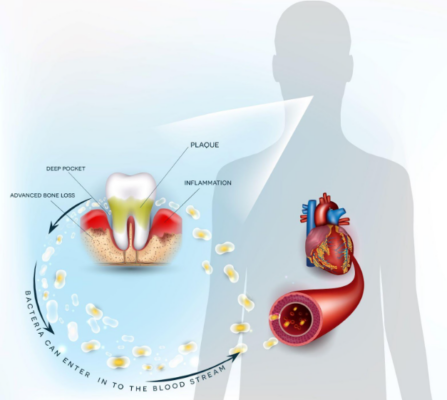Heart disease remains the leading cause of death worldwide, accounting for millions of deaths annually. Understanding how to reduce risk factors associated with cardiovascular disease can significantly impact one’s longevity and quality of life.
This guide explores simple, actionable strategies to help individuals be heart smart.
Prioritize Oral Health To Protect The Heart
The link between oral health and heart disease is well-documented, suggesting that maintaining good dental hygiene is more important than many might assume. For instance, gum disease, characterized by inflamed gums, can be a significant risk factor for heart disease. This inflammation affects the mouth and can cause arterial damage. Also, such damage to the arteries increases the risk of heart attacks and strokes, which requires regular dental check-ups and proper oral care to mitigate these risks.
However, for more detailed information, consider exploring reliable resources that tackle the relationship between gum disease and heart disease to understand how these conditions intersect and affect one’s overall well-being.
Adopt A Heart-Healthy Diet
Nutrition plays a pivotal role in heart health. A diet rich in fruits, vegetables, whole grains, and lean proteins can help reduce inflammation, lower blood pressure, and decrease cholesterol levels—all key factors in preventing heart disease.
Additionally, incorporating foods high in omega-3 fatty acids, such as salmon and flaxseeds, may help improve cardiovascular health by reducing triglycerides and enhancing arterial function.
Engage In Regular Physical Activity
Regular exercise is crucial in maintaining a healthy heart. The American Heart Association recommends at least 150 minutes of moderate aerobic activity or 75 minutes of vigorous activity each week, supplemented by muscle-strengthening activities on two or more days. Exercise may help control weight, reduce the likelihood of developing other heart disease risk factors such as hypertension and type 2 diabetes, and improve heart muscle function.
Manage Stress Effectively
Chronic stress triggers behaviors that elevate heart disease risk, including elevated blood pressure and cholesterol, smoking, sedentariness, and overeating. By effectively managing stress through techniques like mindfulness and yoga, coupled with regular physical activity and sufficient sleep, one may significantly reduce these risk factors. These practices may help alleviate stress and enhance overall heart health, creating a more balanced lifestyle.

Monitor And Maintain Healthy Blood Pressure Levels
High blood pressure is a significant risk factor for heart disease that often goes unnoticed due to its lack of symptoms. As such, regular monitoring can help detect and manage high blood pressure before it causes extensive damage.
Furthermore, lifestyle adjustments, such as reducing sodium intake, limiting alcohol, quitting smoking, and regularly exercising, can be effective strategies for maintaining healthy blood pressure.
Control Cholesterol
Cholesterol management is a critical component of maintaining heart health. Elevated levels of low-density lipoprotein (LDL), often referred to as “bad” cholesterol, can lead to the accumulation of plaque in the arteries, significantly raising the risk of heart attacks and strokes.
A heart-healthy diet that limits saturated fats and trans fats while incorporating nuts, legumes, and fiber-rich foods like oats and barley can help lower LDL levels. Plant sterols, found in fortified foods and dietary supplements, can also reduce cholesterol absorption in the intestine. Regular exercise and avoiding tobacco smoke further aid in keeping cholesterol levels in check, enhancing cardiovascular resilience.
Limit Alcohol And Quit Smoking
Smoking and excessive alcohol consumption are two of the most harmful habits affecting heart health. Smoking constricts blood vessels, leading to atherosclerosis (artery narrowing and hardening) and an increased risk of heart disease. On the other hand, while moderate alcohol intake might be linked to certain health benefits, such as a potentially lower risk of heart disease, excessive drinking can negate these benefits, leading to high blood pressure, heart failure, and other serious conditions.
Quitting smoking and moderating alcohol consumption are vital steps toward reducing heart disease risk and improving overall cardiovascular health. These lifestyle changes can significantly decrease the likelihood of developing heart-related complications, promoting a healthier, longer life.
Perform Regular Health Screenings
Engaging in regular health screenings is vital for early detection of potential medical issues that could escalate into severe conditions if left unattended. These screenings often involve blood pressure, cholesterol levels, and blood sugar evaluations to identify signs of hypertension, high cholesterol, or diabetes—common precursors to heart disease.
By identifying these issues early, individuals can take necessary preventive measures or treatments, greatly reducing the risk of heart complications and improving overall health outcomes.
Sleep Well
Adequate sleep is essential for maintaining optimal physical health and particularly crucial for heart health. Insufficient sleep has been associated with an increased risk of developing cardiovascular risk factors, such as high blood pressure, obesity, and diabetes. Ensuring a consistent 7-9 hours of quality sleep each night can significantly benefit heart function and general health.
Good sleep hygiene, including a regular sleep schedule and a conducive sleeping environment, can also help achieve restful and restorative sleep, which are essential for cardiovascular health.
Final Thoughts
Reducing the risk of heart disease involves a combination of lifestyle choices and regular medical check-ups. By implementing these simple hacks, individuals can significantly enhance their cardiovascular health and reduce the likelihood of developing heart disease. Remember, each step taken is a move toward a healthier, more vibrant life.











